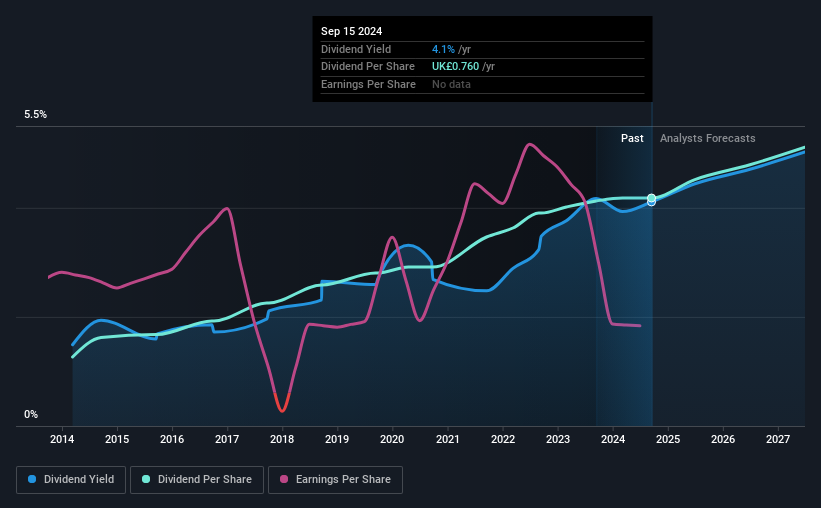- United Kingdom
- /
- Capital Markets
- /
- LSE:BRK
Don't Buy Brooks Macdonald Group plc (LON:BRK) For Its Next Dividend Without Doing These Checks

Some investors rely on dividends for growing their wealth, and if you're one of those dividend sleuths, you might be intrigued to know that Brooks Macdonald Group plc (LON:BRK) is about to go ex-dividend in just three days. Typically, the ex-dividend date is one business day before the record date which is the date on which a company determines the shareholders eligible to receive a dividend. The ex-dividend date is important as the process of settlement involves two full business days. So if you miss that date, you would not show up on the company's books on the record date. Accordingly, Brooks Macdonald Group investors that purchase the stock on or after the 19th of September will not receive the dividend, which will be paid on the 1st of November.
The company's next dividend payment will be UK£0.49 per share. Last year, in total, the company distributed UK£0.76 to shareholders. Last year's total dividend payments show that Brooks Macdonald Group has a trailing yield of 4.1% on the current share price of UK£18.50. Dividends are an important source of income to many shareholders, but the health of the business is crucial to maintaining those dividends. That's why we should always check whether the dividend payments appear sustainable, and if the company is growing.
See our latest analysis for Brooks Macdonald Group
Dividends are usually paid out of company profits, so if a company pays out more than it earned then its dividend is usually at greater risk of being cut. Brooks Macdonald Group paid out 107% of its earnings, which is more than we're comfortable with, unless there are mitigating circumstances.
Generally, the higher a company's payout ratio, the more the dividend is at risk of being reduced.
Click here to see the company's payout ratio, plus analyst estimates of its future dividends.

Have Earnings And Dividends Been Growing?
Companies that aren't growing their earnings can still be valuable, but it is even more important to assess the sustainability of the dividend if it looks like the company will struggle to grow. If business enters a downturn and the dividend is cut, the company could see its value fall precipitously. With that in mind, we're not enthused to see that Brooks Macdonald Group's earnings per share have remained effectively flat over the past five years. It's better than seeing them drop, certainly, but over the long term, all of the best dividend stocks are able to meaningfully grow their earnings per share.
Another key way to measure a company's dividend prospects is by measuring its historical rate of dividend growth. Brooks Macdonald Group has delivered 13% dividend growth per year on average over the past 10 years.
Final Takeaway
Has Brooks Macdonald Group got what it takes to maintain its dividend payments? Brooks Macdonald Group has an uncomfortably high payout ratio, and its earnings have not grown at all. All things considered, we're not optimistic about its dividend prospects, and would be inclined to leave it on the shelf for now.
Although, if you're still interested in Brooks Macdonald Group and want to know more, you'll find it very useful to know what risks this stock faces. For example - Brooks Macdonald Group has 3 warning signs we think you should be aware of.
Generally, we wouldn't recommend just buying the first dividend stock you see. Here's a curated list of interesting stocks that are strong dividend payers.
Valuation is complex, but we're here to simplify it.
Discover if Brooks Macdonald Group might be undervalued or overvalued with our detailed analysis, featuring fair value estimates, potential risks, dividends, insider trades, and its financial condition.
Access Free AnalysisHave feedback on this article? Concerned about the content? Get in touch with us directly. Alternatively, email editorial-team (at) simplywallst.com.
This article by Simply Wall St is general in nature. We provide commentary based on historical data and analyst forecasts only using an unbiased methodology and our articles are not intended to be financial advice. It does not constitute a recommendation to buy or sell any stock, and does not take account of your objectives, or your financial situation. We aim to bring you long-term focused analysis driven by fundamental data. Note that our analysis may not factor in the latest price-sensitive company announcements or qualitative material. Simply Wall St has no position in any stocks mentioned.
About LSE:BRK
Brooks Macdonald Group
Through its subsidiaries, provides a range of investment and wealth management services to private clients, pension funds, professional intermediaries, and trustees in the United Kingdom, and the Channel Islands.
Flawless balance sheet average dividend payer.
Similar Companies
Market Insights
Community Narratives



